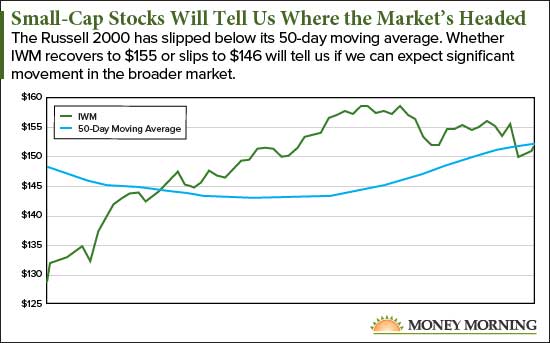Stocks are off to a hot start this year, with the S&P 500 racing to an 11% gain since the year began. But between Brexit, an inverted yield curve, and the Mueller report, there are many reasons to feel uncertain about the direction stocks could head next.

Thankfully, you don't need a crystal ball to find out. We've got the one number to watch that will tell you where stocks are going over the next several weeks or more.
All you have to know is what Money Morning Quantitative Specialist Chris Johnson has been saying all along: Small-cap stocks are a bellwether for the broader stock market.
That's why it's significant that the Russell 2000 moved below its 50-day moving average.
As of last week, Chris was looking for the small caps in the Russell 2000 to "take some leadership" - a move that up to that point hadn't happened.
With this latest move downward, the situation is looking more precarious.
The Russell 2000 did creep back up late on Monday and into Tuesday, but that doesn't mean we're out of the woods yet.

The iShares Russell 2000 ETF (NYSEARCA: IWM) now sits around $152, down from $158 a month ago. If we're going to see a strong market rebound over the next month or so, expect to see IWM to get back up at least in the $155 range.
Earlier this week, the ETF dipped down to $150 before rebounding slightly. That's key. If it falls below that milestone, that could easily send small caps - and the rest of the stock market - slipping further downward.
If IWM falls even further - below about $146 - that's likely to indicate a significant downward correction for stocks across the board.
That means you can forget about the news. Forget about what's going on in Washington. Forget about what's going on with The Boeing Co. (NYSE: BA). Forget about China and trade wars and Fed meetings and Brexit.
That number - IWM at $146 - is the one number you want to look for to indicate that it's time to go into protection mode with your portfolio.
Of course, that gets us to the most important question: what to do when stocks are about to tank.
How to Protect Yourself and Profit in a Down Market
[mmpazkzone name="in-story" network="9794" site="307044" id="137008" type="4"]
The truth is that a market downturn is nothing to fear. In fact, for an investor with a plan, some of the best profit opportunities come when stocks are on the way down.
For starters, think about all the stocks you like but have avoided buying because of the price tag. Money Morning Chief Investment Strategist Keith Fitz-Gerald suggests keeping a running list of "lowball orders" on these stocks.
Take Apple Inc. (NASDAQ: AAPL), for instance. Back in October, it was trading at more than $230 per share. If you had placed a lowball order at $150 - virtually unthinkable at the time - you would have gotten your desired price just a couple months later.
Today, just a couple months after that, you'd be sitting on a 25% gain.
A potential correction on the way means it's a great time to place similar lowball orders on stocks you've been keeping an eye on in order to grab a bargain... or two, or three.
That strategy, of course, is a great way to profit once the market turns back up. But you can also profit while the market is on the way down thanks to options trading.
Buying a "put" option gives you the right to sell a stock at a specific price on a specific date set by the contract. If the stock price goes down before the contract expires, you can sell the options at a higher price than you paid and collect a profit.
Put options offer several advantages over short-selling.
- You spend less up front because you're only buying the option to sell. You're not committing to buying and selling any shares if you choose not to.
- You take on less risk for the same reason. If the stock price isn't going your way, you simply close out your position. You don't risk any more than you spent on the option.
- You increase your profits. That's because options come in bundles of 100 shares, and you buy them for a fraction of the share price. So you get the benefit of leveraging many more shares than you could ever afford to buy outright, as you would have to do if you were short selling.
Money Morning's options trading specialist, Tom Gentile, can guide you through the process and give you specific strategies to employ put options.
Whichever strategy you go with, you won't have to worry about a market downturn now or ever again. You know what to look for. You know how to profit from it.
And you know we'll be helping you every step of the way.
Follow Money Morning on Facebook and Twitter.
About the Author
Stephen Mack has been writing about economics and finance since 2011. He contributed material for the best-selling books Aftershock and The Aftershock Investor. He lives in Baltimore, Maryland.



